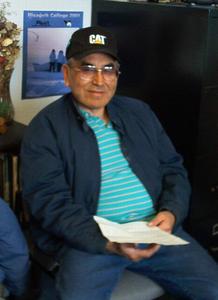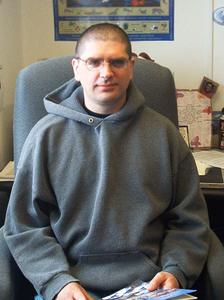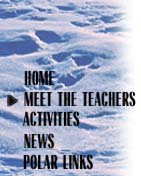24 April, 2003
Inupiaq Perspective
Today in Kotzebue
The 15ft snow mounds littered around the city, the trucks peaking
out from under ice relate the story of a long cold Kotzebue winter but
the rain on my tin roof tells me that Spring has arrived a bit early
this year.
What science is happening
The weather conditions have necessitated canceling our trip to ice
camp for today. There is some concern that the near shore area ice
could be hazardous. Terry and Melinda Reynolds are already at camp are
finishing up some sampling and will come back in tonight. It is
possible that we will make a day trip out to Camp Krusenstren to sample
some lagoons tomorrow, depending on the weather.
Today during our conference call with classrooms around the country
we were joined by Alex Whiting and John Goodwin who talked to students
about the Inupiaq perspective on traditional ecological knowledge,
working with scientists and changes in the Kotzebue area.
Classroom Connections
Mr. Goodwin talked to the classes about the changes during his life
time. While the scientists on this project have only been here, off
and on, for 2 years, people like Mr. Goodwin have had a long time to
observe and mark change. As we talked about the unseasonable warm
weather, Mr. Goodwin noted that they don’t see the negative 60 degree
winters anymore. As a boy, Mr. Goodwin remembers before the town had
electricity, or gas furnaces. He remembers when families cut ice from
the river for drinking water and used honey buckets*; he remembers
before snow machine travel when each family had a sled and dogs.
Students can go home talk to parents, grandparents, local nursing
home residents and make a local time line. Data can be combined to
make a class time line, then separated according to the type of
information. Once stripe could be advancing technology, another could
be pass times, another could be local environment, animals or just the
town. For example grandma may be able to tell you when the local
shopping mall was a farmers field. When you have your data laid out
you can look for cause and effect. Mr. Goodwin tells us that games
helped prepare kids for hunting, but now they only watch TV. Was the
technology the cause of kids getting less prepared or less exercise?
Mr. Goodwin also tells us that Beluga Whales used to come into the
harbor in the spring. Does the fact that they are rare around the city
coincide with snow machines, cars and other noise making vehicles
becoming popular? We study what is past to look for patterns. When we
know patterns, we can predict and prepare for what the future holds.
Words to know
Honey bucket- It was a bucket people used
for…um…well... before they had indoor bathrooms.
Reflections
Listening to someone
talk about the changes that can occur in one lifetime is cause for
reflection. I reflect on the changes during my life in technology,
attitudes, education and people and I wonder what changes will my
students talk about when they are ready to retire. I wonder what
things in the world I would still be able to recognize.
Links
Learn
more about our project here
View curriculum for this project, “Ask a Scientist” and
learn about other Arctic Real Time research at Arctic Alive
City of
Kotzebue Webpage
Listen to the local radio station KOTZ live

John Goodwin, local resident, elder and boat captain was able to talk to students around the country about the Inupiaq perspective during our Arctic Alive conference call.

Alex Whiting, who works for the Kotzebue IRA (comes from Indian Relocation Act) an organization that represents the Inupiaq tribal intersts, was also able to give input on the Inupiaq way of life.
Contact the TEA in the field at
.
If you cannot connect through your browser, copy the
TEA's e-mail address in the "To:" line of
your favorite e-mail package.
|






